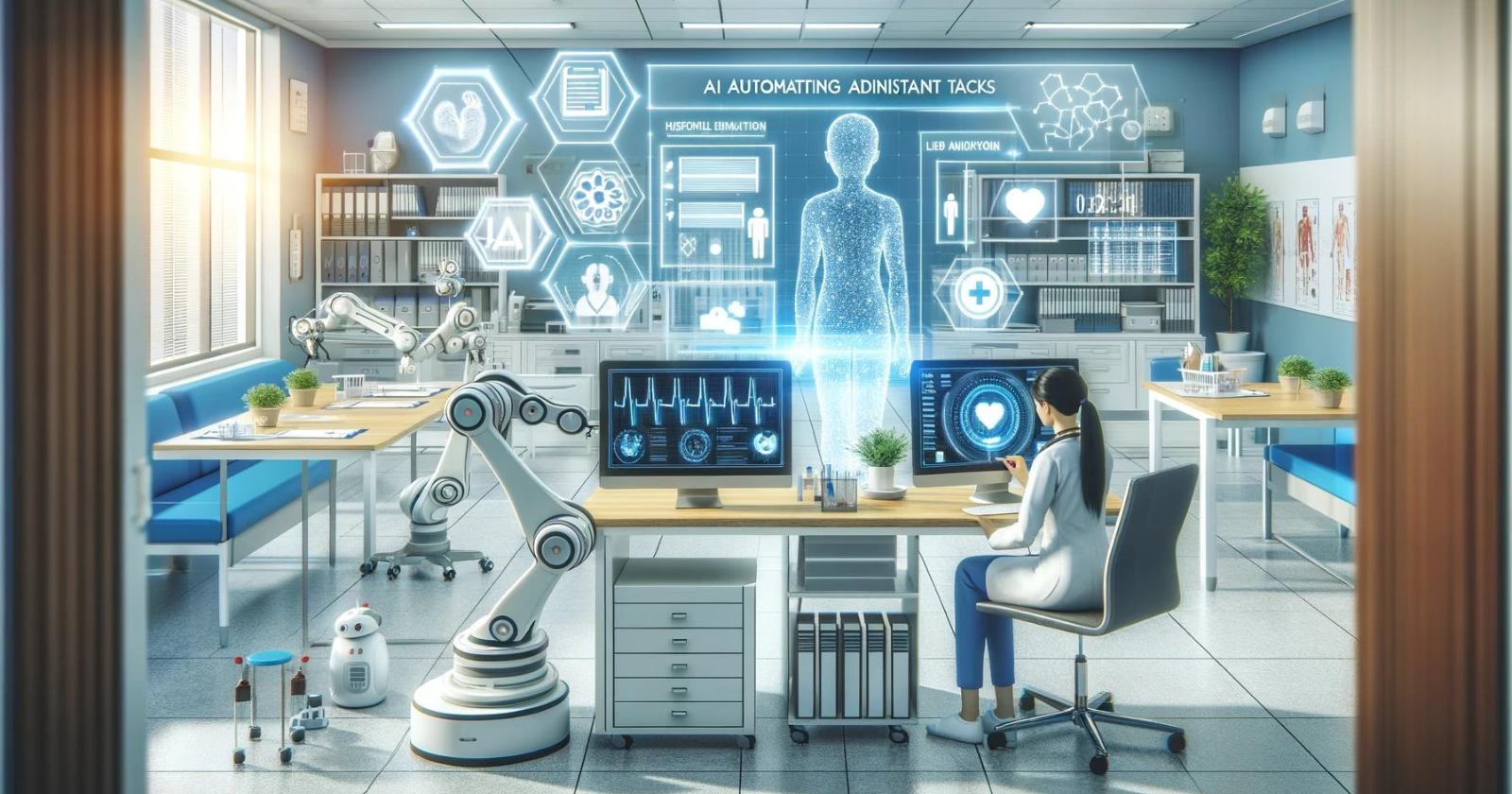AI Automating Patient Care and Administrative Tasks: Enhancing Efficiency in Healthcare
Have you ever imagined a world where AI not only supports your healthcare but also handles the nitty-gritty administrative tasks that come with it? Imagine visiting a clinic where, instead of drowning in paperwork, healthcare professionals have their time freed up to provide you with their undivided attention. That reality is not as far off as you might think. AI is revolutionizing patient care and streamlining administrative processes, making healthcare experiences smoother for both patients and providers.
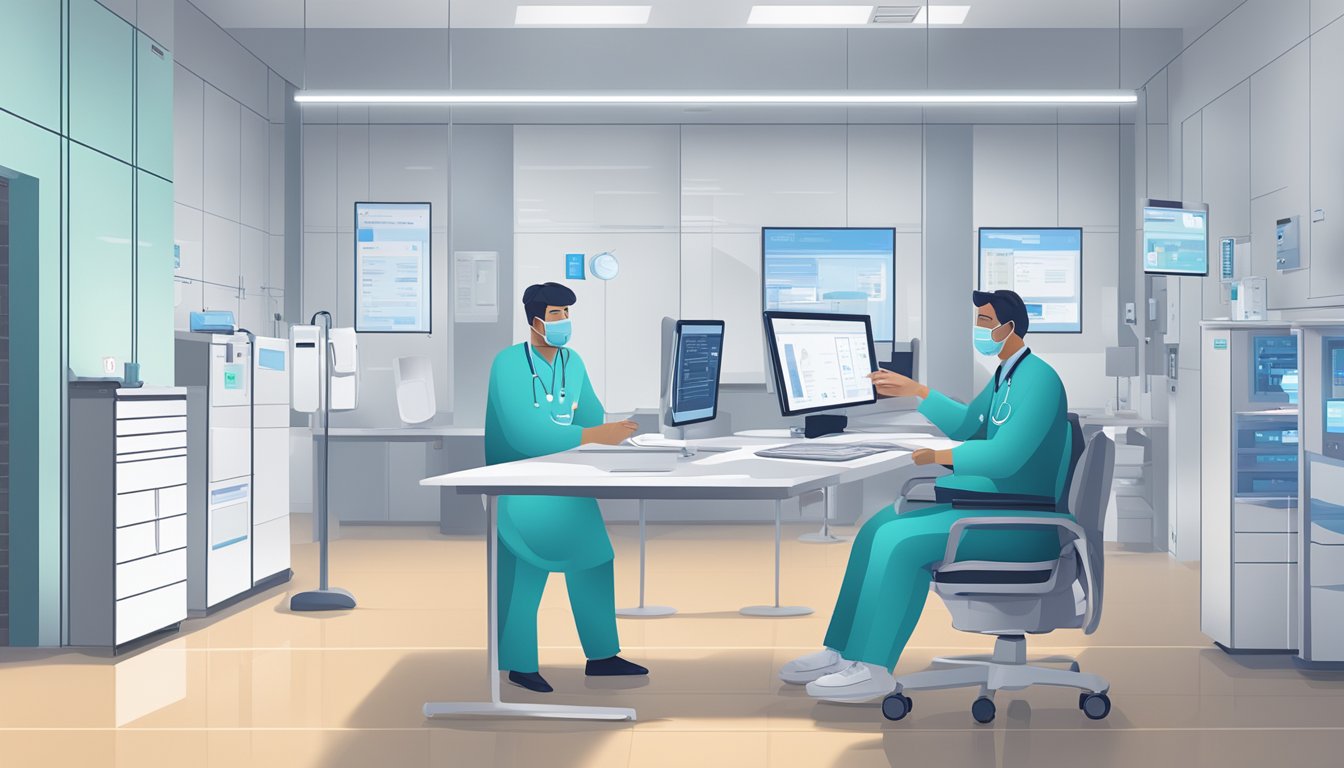
Think about the last time you scheduled a doctor’s appointment. How was that experience? Now, consider a future where AI handles appointment scheduling, patient registration, and insurance verifications without a hitch. It’s transformative technology that’s here to make healthcare more efficient and less error-prone. By automating these tasks, not only are the processes accelerated, but healthcare staff can also redirect their efforts towards what really matters—patient care.
The integration of AI in healthcare goes beyond administrative tasks. It’s stepping into directly impacting patient care by assisting with treatment recommendations and monitoring health trajectories. These advancements have a profound potential to reduce the risk of human error, personalize medical treatment, and ultimately, improve health outcomes. Healthcare professionals can leverage AI to focus more on providing care and less on the paperwork, which might just make those dreaded hospital visits a little less stressful for you.
The Intersection of AI and Healthcare
In the rapidly evolving world of healthcare, you’ve probably heard how AI is making waves, but have you seen it in action? Let’s unpack the ways artificial intelligence is not just reshaping patient care but also making the life of healthcare workers a bit easier.
Revolutionizing Patient Care with AI
Artificial intelligence is like that new superhero in town who’s got a knack for diagnosing diseases with a speed and accuracy that’s nearly superhuman. Imagine software that scans medical images and flags potential issues before you’ve even finished your coffee. This isn’t sci-fi; it’s happening right now. AI systems are helping to detect conditions from cancer to retinal diseases, and they’re doing it with a precision that astonishes even the seasoned pros.
- Enhanced Diagnostics: AI algorithms excel at analyzing complex medical data, spotting patterns that might be missed by the human eye.
- Personalized Treatment: AI takes into account your unique medical history, tailoring treatment plans just for you. Isn’t that something?
Here’s a fun fact: some AI systems have become so adept at reading X-rays and MRIs, they’re like the eagle-eyed detectives of the radiology world.
Streamlining Healthcare Administration
But what about the mountains of paperwork and the labyrinth of administrative tasks that healthcare staff navigate daily? Good news! AI is here with its digital toolkit to trim down those tedious tasks to size. By automating scheduling, billing, and patient record management, AI is turning the tide on inefficiency—freeing up medical staff to focus on you, rather than their keyboards.
- Savvy Scheduling: AI quickly optimizes appointment schedules to reduce wait times.
- Smart Record Keeping: Automatically updating patient records with AI reduces errors and keeps your data safe.
Consider this: AI doesn’t need a coffee break and doesn’t get tired. It works round the clock to keep things running smoothly, ensuring that when you need care, everything is set up for a seamless experience.
With all of this tech talk, remember, the goal is simple: better care for you and a helping hand for those dedicated folks in healthcare.
AI’s Role in Clinical Decision-Making and Treatment
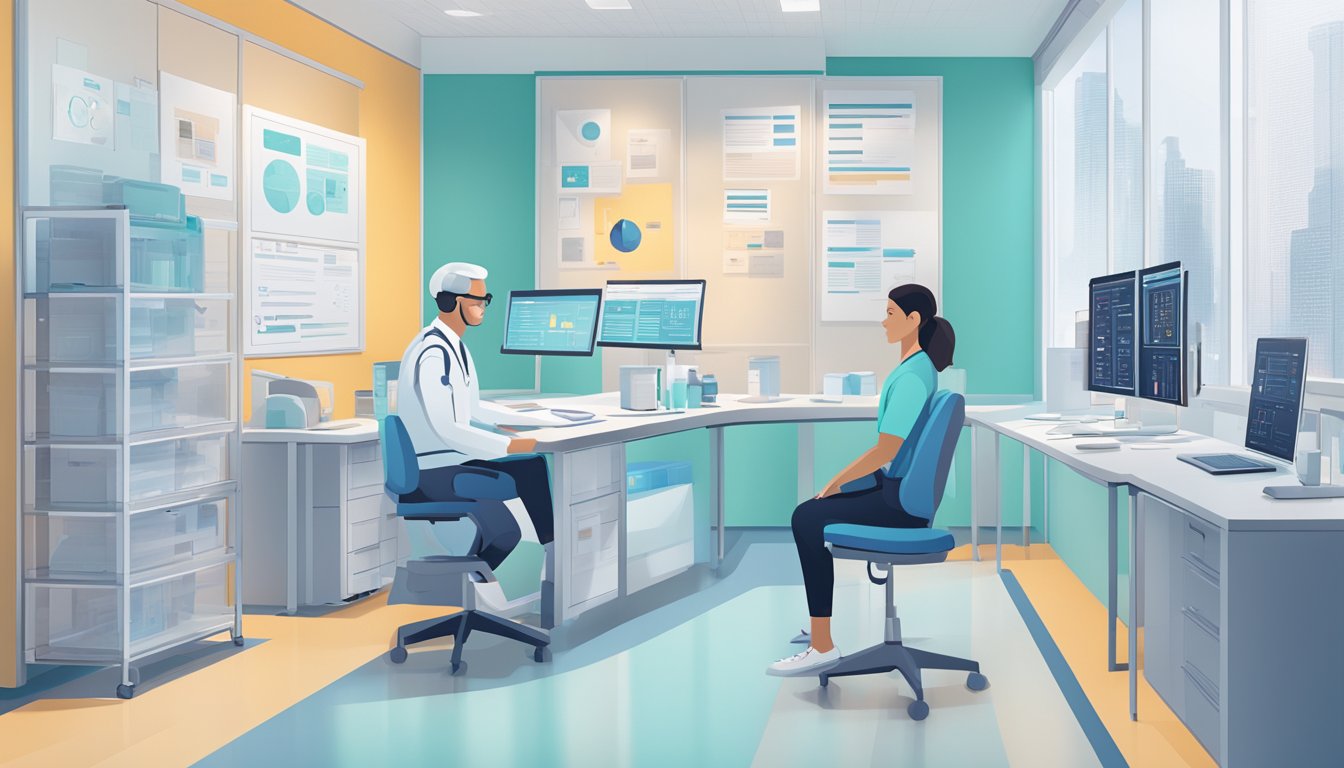
Have you ever wondered how the fusion of healthcare and technology could affect your treatment experience? Well, the impact is monumental! Let’s dive right into how AI is shaping clinical decision-making and personalizing treatment plans, ensuring outcomes are better than ever!
Personalizing Treatment Plans
Imagine a world where your treatment is tailored just for you. That’s where AI comes in—it’s like a bespoke suit maker for your health. AI systems analyze your unique health data, including genetic information, to craft personalized treatment plans that fit your specific needs like a glove. It reduces the trial-and-error approach significantly, so it’s out with the ‘one-size-fits-all’ and in with precision medicine!
- Data Analysis: AI sifts through mountains of data to find the perfect treatment cocktail.
- Ongoing Adjustments: Your plan adapts over time, optimizing your health outcomes.
AI-Powered Diagnosis and Prognosis
Diagnosis can be tricky—it’s like trying to solve a complex puzzle. But with AI, it’s as if you’ve got the best puzzle-solving champ by your side. By using sophisticated algorithms, AI provides diagnostic insights and prognosis forecasts that can outperform traditional methods. We’re talking faster, more accurate diagnoses that get you on the road to recovery sooner.
- Detect Patterns: Scans and tests? AI finds patterns faster than seasoned pros.
- Predictive Prognosis: What does the future hold? AI might have a sneak peek into your medical outcomes.
With AI in your corner, the future of healthcare is looking sharp—precise, personalized, and full of potential. Ready to team up?
Operational Efficiency and Workflow Optimization
In the bustling world of healthcare, your time is precious. Enter the game-changing duo: improved workflow efficiency and reduced administrative burden. By embracing these, you can see significant improvements in your day-to-day tasks and patient care delivery.
Improving Workflow Efficiency
Why wait when you can act now? Automation is transforming healthcare by streamlining workflows, making sure that every minute counts. Imagine a world where patient data flows seamlessly from one system to another, eliminating redundant steps and speeding up care delivery. With intelligent systems like ISUMO, the focus is on cracking the code of efficiency in workflows, one step at a time. Here’s a glimpse at how:
- Identify and evaluate: Pinpointing bottlenecks in your current workflow.
- Implement smart solutions: Integrating AI tools that talk to each other and share information effortlessly.
Reducing Administrative Burden
Ever felt drowning in paperwork? You’re not alone. Healthcare professionals spend hours on administrative tasks that could be automated. By reducing this administrative burden, you carve out more time for patient care. Systems are already in place to harvest these time savings and redirect them into work that matters—like the operational AI systems that significantly save time from automating routine tasks.
- Automate the mundane: Shifting repetitive tasks from humans to machines.
- Invest in improvements: Reallocating saved resources to enhance patient flow and care quality.
By focusing on these areas, you’re not just cutting down on busy work; you’re reinventing the healthcare experience for both patients and providers. Efficient, automated, and patient-centric—this is how care delivery should always be.
Data Management and Electronic Health Records

Embracing the age of digital health care, you’re now witnessing a transformative era where data and electronic health records (EHR) are not just static repositories of information but dynamic tools enhancing patient care. The effective management of this data is crucial, and ensuring its privacy and security is paramount.
Advanced Data Analytics for Better Outcomes
Have you ever wondered how we can cut through the noise and find patterns that lead to better health outcomes? Let’s dive right in! Advanced data analytics, powered by artificial intelligence tools such as Azure AI Health Insights, take your messy heaps of data and turn them into meaningful insights. Imagine a world where predictive analytics can flag potential health risks before they become pressing issues, all thanks to the meticulous analysis of data from electronic health records. What does this mean for you? A roadmap to a healthier life, potentially with fewer trips to the doctor.
- Uses of advanced data analytics in EHR:
- Identification of at-risk patients
- Trend analysis for public health initiatives
- Personalization of patient care plans
Ensuring Privacy and Security
Your privacy is a big deal, isn’t it? We’re on the same page. But with great power comes great responsibility, and when we say ‘power,’ we’re referring to the potent combination of EHR and AI. The integration of EHRs with AI tools, as seen with AI Health Bot, raises the stakes for privacy and security concerns. As more personal data is shared within the healthcare system, robust privacy laws and advanced cybersecurity measures are non-negotiable to protect your sensitive information. We’re talking encryption, access controls, and continuous security monitoring to ensure that only the right eyes are on your health records.
- Key measures to uphold privacy and security:
- Strict adherence to privacy regulations like HIPAA
- Frequent risk assessments and security updates
- Training programs for staff on data handling best practices
By integrating AI into data management and electronic health records while fortifying the defences against privacy breaches, healthcare is steadily marching towards an era of smarter, safer, and more individualized patient care. And that’s a win for you, your health, and your peace of mind!
AI Technologies in Patient Communication and Support
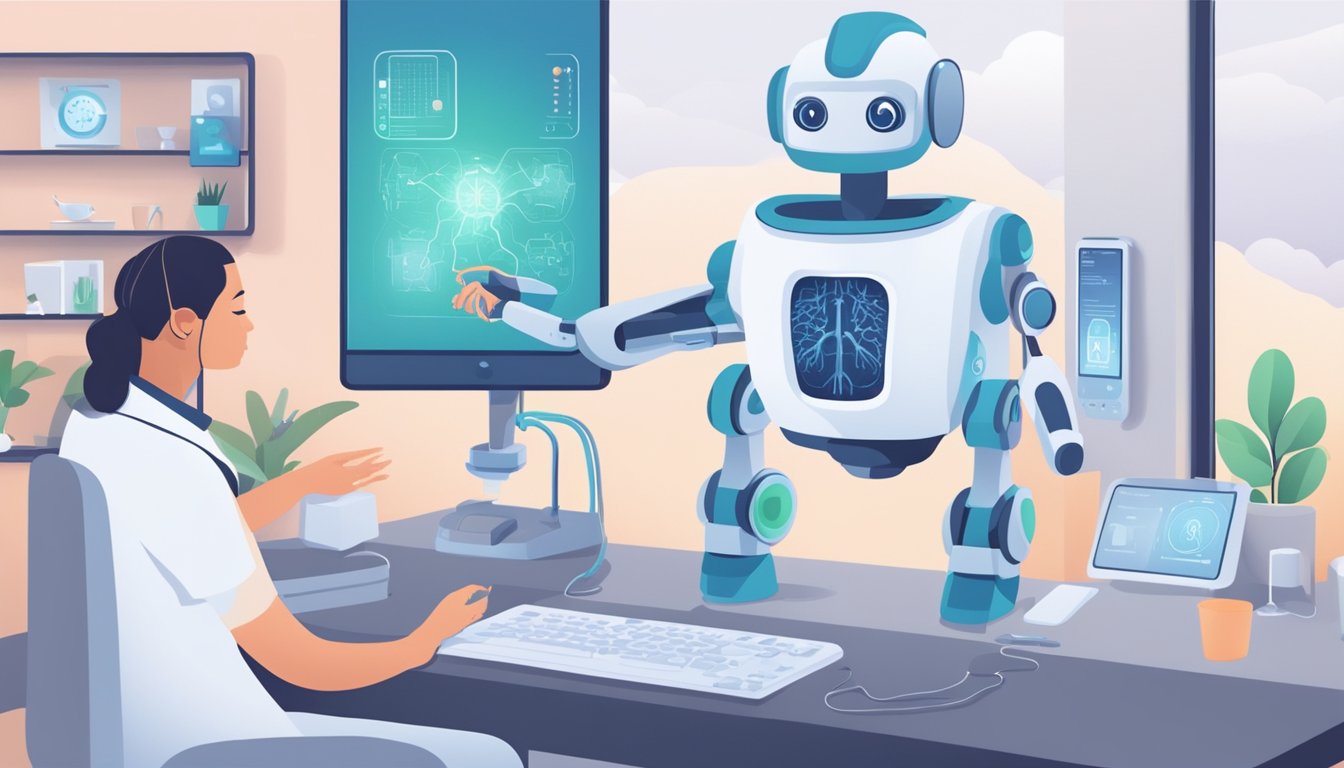
In the evolving landscape of health care, Artificial Intelligence (AI) is revolutionizing the way you communicate with your health service providers. Providing real-time assistance and personalized patient education has become more efficient than ever.
Virtual Assistants and Chatbots
Have you ever imagined having a 24/7 healthcare companion? Well, virtual assistants and AI chatbots are making this a reality. These advanced tools are here to engage you whenever you need it—be it middle of the night or during a busy day. Providers are leveraging technology to ensure that you receive immediate answers to your health inquiries. From scheduling appointments to reminding you of medication times, these AI-driven systems like RingCentral can help reduce the time healthcare staff spend on administrative duties, letting them focus more on your care.
- Tasks Managed by Virtual Assistants:
- Appointment scheduling
- Medication reminders
- Symptom checking and preliminary assessments
Tailored Patient Education and Support
When it comes to understanding your health, one size doesn’t fit all. AI technologies have the capability to deliver tailored patient education. Such systems analyze your health history, preferences, and current health status to provide custom information and support. They can guide you through recovery processes, explain the intricacies of a new diagnosis in layman’s terms, or provide dietary and lifestyle recommendations. For example, AI tools have been developed for predicting health trajectories and recommending treatments, thereby supporting you through personalized education and throughout your healthcare journey.
- Benefits of Tailored Patient Education:
- Personalized care plans
- Improved understanding of your health condition
- Enhanced engagement in your health management
Ethical Considerations and Compliance in AI
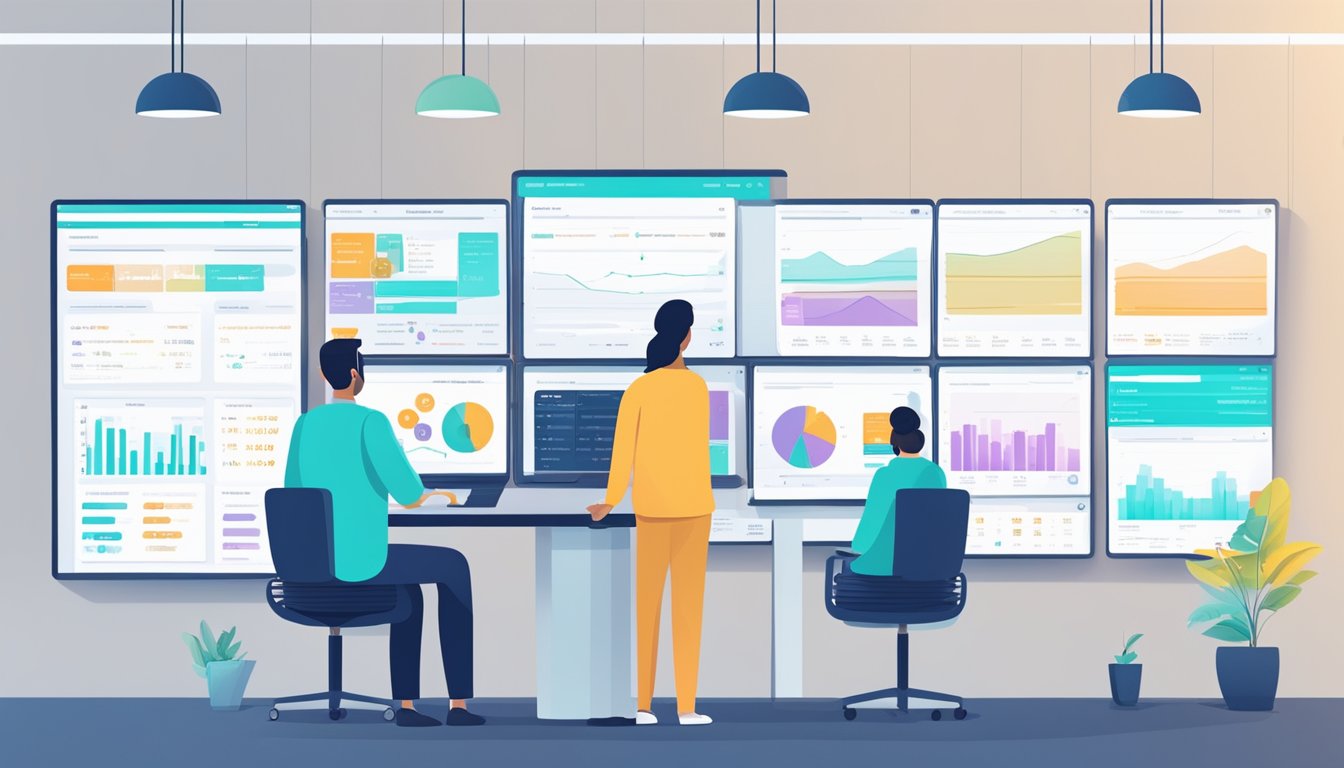
As AI becomes more prevalent in healthcare, it’s essential that you understand how it intersects with ethical norms and regulatory standards. Ensuring that patient trust remains intact and that bias is minimized in AI applications, is as crucial as adhering strictly to compliance measures. Let’s explore what that really means for you.
Maintaining Trust and Mitigating Bias
Have you ever wondered how AI can affect the trust patients place in their healthcare providers? It’s a big concern when you consider the implications of decisions made by machines. Ethical AI in patient care hinges on maintaining trust, which can only be achieved if the AI systems are transparent and understandable. You’d agree it feels better knowing why and how a decision about your health is made, right?
Bias in AI is another hot-button issue. Just think about it—the data used to train AI models come from us, humans, and we all have our own set of biases. If care’s not taken, those biases can slip into AI systems. To mitigate this, healthcare AI must be routinely checked for discrimination, ensuring fairness across all genders, ethnicities, and socioeconomic backgrounds. Are the decisions fair? Are they equitable? These are the kind of questions developers and healthcare providers must ask themselves.
Compliance with Healthcare Standards
Now let’s tackle standards and compliance. In healthcare, AI applications are expected to comply with a myriad of regulations, like the Health Insurance Portability and Accountability Act (HIPAA) in the US—ever heard of it? These regulations are not just red tape; they protect patient data and ensure that the care provided is not just innovative, but also safe and legal. For AI systems, compliance means incorporating these standards right from the design phase. Early and rigorous testing? Absolutely necessary!
But it’s not all checkboxes and audits. While adherence to standards can seem like a daunting task, it actually provides a path for AI systems to be recognized as credible and reliable. What’s more, knowing your AI-backed care respects privacy laws and ethical guidelines, wouldn’t that give you a little peace of mind?
There you have it: a quick look into the world of ethics and compliance in AI for healthcare. Remember, as much as AI is about algorithms and code, it’s also about keeping the human touch in healthcare—keeping it real, keeping it trustworthy, and making sure it works for everyone.
Cost Management and Financial Impacts of AI
Ever wondered how AI could actually make things easier on your wallet, especially in healthcare? It’s not just about robots and fancy gadgets; it’s about real savings and smarter billing.
AI in Billing and Reimbursement Processes
You know how complicated healthcare billing can be, right? Well, AI is like your smart friend who helps you sort it out. It automates error-prone tasks, making sure that billing is accurate leading to efficient reimbursement. This not only streamlines the process but also speeds up the time it takes for healthcare providers to get paid. Yeah, AI’s got your back here!
- Accuracy: Ensures claims are coded correctly the first time.
- Speed: Accelerates the billing process by reducing manual entry.
- Compliance: Assists in staying current with rapidly changing regulations.
Cost Savings and Value-driven Care
Who doesn’t like saving money? AI is a game-changer for cost savings with its ability to automate mundane tasks and analyze big data to predict patient outcomes better. Imagine reducing overhead costs and investing that money back into providing top-notch care. That’s AI bringing value-driven care to the forefront.
- Overhead Reduction: Cuts down on administrative expenses.
- Predictive Analysis: Identifies patterns that lead to better patient care at lower costs.
- Resource Allocation: Optimizes the use of medical facilities and equipment.
Remember, these aren’t just pie-in-the-sky ideas. They’re happening right now, and they’re making a real difference to both patients and providers. So the next time you hear about AI in healthcare, think about the green—it’s not just good for your health but also friendly for your budget!
Future Perspectives in AI-Enhanced Healthcare
As you step into the world of healthcare’s future, imagine a landscape where AI not only revolutionizes patient care but also streamlines tedious administrative tasks. Let’s peek into what’s coming next!
Innovation and Scalability Opportunities
Do you ever wonder just how personalized healthcare could get? Think about AI algorithms that could analyze your genetics and lifestyle, tailoring treatments and wellness plans just for you. We’re talking about a future where scalability isn’t a dream but a reality, where healthcare systems expand their capabilities without losing their touch.
- Genetic Analysis: AI could help to quickly interpret genetic data, making personalized medicine more accessible and affordable.
- Lifestyle Adjustments: Imagine receiving health recommendations that consider your daily habits and preferences.
Opportunities for innovation seem limitless. With each stride in AI, healthcare could become more efficient and responsive to your unique needs.
Challenges and Future Directions
Now, let’s not sugarcoat it—there are hurdles to overcome. Embracing AI in healthcare comes with its fair share of challenges. Do you think about privacy when you hear about AI? You should. Safeguarding your data while harnessing AI’s power is a balancing act for the tech-savvy healthcare sector.
- Ethical Considerations: Balancing technology with human touch will be crucial. Ensuring AI complements rather than replaces human clinicians.
- Data Protection: Robust systems will be needed to protect sensitive patient data from cybersecurity threats.
As we pave the way for AI in healthcare, you might be curious about the future directions. Will AI reach a point where it can fully automate administrative tasks or assist in complex medical diagnoses? The aim is clear: improve care quality while making it more accessible and less burdensome for healthcare providers.
Frequently Asked Questions
Curious about how AI is transforming healthcare? Below you’ll find answers to common inquiries about how AI is upgrading patient care and making administrative duties a breeze!
How can AI streamline administrative tasks in healthcare, and could you give some examples?
AI in healthcare is a game-changer for administrative efficiency. For instance, a framework like ISUMO simplifies task management by breaking it down into actionable steps. Other AI tools automate the coding and processing of medical claims, cutting down on the time your health professionals spend on paperwork.
In what ways is AI currently enhancing patient care and what’s its potential impact on future treatments?
AI boosts patient care by assisting in diagnostics, personalizing treatment plans, and even predicting patient outcomes. Imagine a future where AI-powered analysis leads to quicker, more accurate diagnoses. From monitoring patient vitals to analyzing vast amounts of medical data, AI’s role in future treatments looks nothing short of revolutionary.
What administrative tasks in healthcare facilities are seeing the most improvement through the adoption of AI?
One significant impact AI has is on the reduction of the time nurses and doctors spend on documentation. Through tools like voice-to-text documentation and automated charting systems, they now have more time for direct patient care.
Are there any standout AI applications that are revolutionizing healthcare, and what makes them the best?
Certain AI applications in healthcare are indeed creating a buzz. Examples include virtual health assistants that provide real-time patient support or AI-driven predictive analytics that help manage and predict chronic diseases. These applications stand out because they enhance efficiency and accuracy across the healthcare spectrum.
How are healthcare providers leveraging AI to improve patient experience, and can you share success stories?
Healthcare providers are turning to AI to tailor patient interactions, thus improving satisfaction. From personalized treatment recommendations to virtual assistant-guided check-ins, the patient experience is getting an upgrade. Success stories include the use of AI in telemedicine, where care reaches patients beyond the clinic walls.
What developments can we anticipate in the intersection of AI and healthcare, especially regarding patient care?
Expect to see AI take on more predictive tasks, like foreseeing potential health issues before they become serious problems. There’s also buzz around AI’s role in genetics and personalized medicine, which could mean treatments designed specifically for your genetic makeup, leading to better health outcomes.

